You might have the greatest special effects of all time, or an incredibly committed cast, but if your story is no good, then nothing can save your film.
This week I watched two films that failed on the page. Dark Places suffers from its commitment to mediocre source material, and the horrendous Fantastic Four is a intro course in how not to write a screenplay.
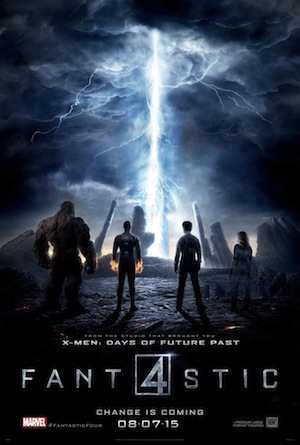 Fantastic Four
Fantastic Four
[Rock Fist Way Down]
What in the hell happened to Josh Trank? He made Chronicle. Chronicle was good.
I am not talking about his twitter rant, or the excuses leveled against Fox that he could not make the film he wanted. If you watch the film, look at each scene, and listen to the dialogue, Fantastic Four was terrible from Trank’s awful script on.
Take for instance young Reed Richards. As he shows his teleportation device to young Ben Grimm, Grimm asks if Richards’ parents care about his scientific experimentation. Richards answers that his parents just don’t understand him. That would be fine if young Richards was just filling in his classmate on a relationship that the viewer was already privy to, but we have yet to even see Richards parents. We do finally meet Mr. and Mrs. Richards in a 5 to 10 second cut away. All I can tell you is that they seem to appreciate a clean kitchen and like to watch TV.
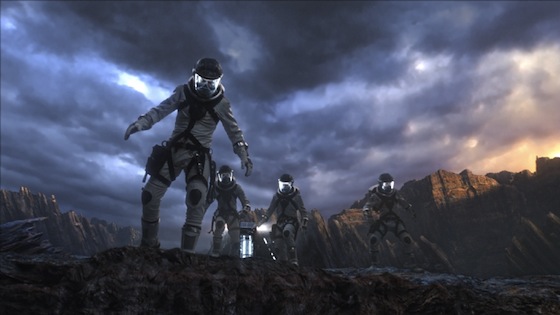 This tell-don’t-show approach plagues Fantastic Four. From thematic pronouncements like, family sticks together, to open expression of inner motivation such as Richards mournful, “I’ll fix this,” or his moderately triumphant, “He’s not stronger than all of us,” Trank’s screenplay is littered with dialogue driven exposition and soliloquy that the viewer should see instead of hear.
This tell-don’t-show approach plagues Fantastic Four. From thematic pronouncements like, family sticks together, to open expression of inner motivation such as Richards mournful, “I’ll fix this,” or his moderately triumphant, “He’s not stronger than all of us,” Trank’s screenplay is littered with dialogue driven exposition and soliloquy that the viewer should see instead of hear.
Trank’s overly serious and controlled direction of his actors further deadens any energy in this film. Miles Teller is under used as teen Reed Richards. He should have been more Chris Knight and less Jerry Hathaway. Kate Mara, Jamie Bell, Toby Kebbell, and Michael B. Jordan are never allowed to exert enough personality to make them more than interchangeable cogs in this terrible machine.
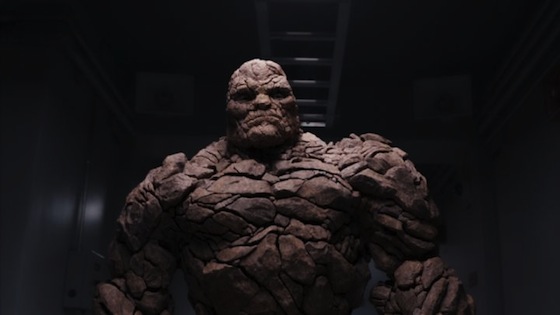 He can flail and shout that he was an indie auteur crushed by the weight of the Hollywood studio. Part of that may be true, but Josh Trank is responsible for the worst of it, writing a shitty script and directing it poorly.
He can flail and shout that he was an indie auteur crushed by the weight of the Hollywood studio. Part of that may be true, but Josh Trank is responsible for the worst of it, writing a shitty script and directing it poorly.
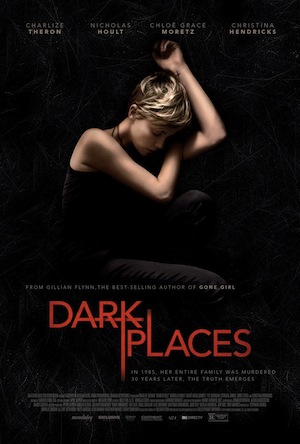 Dark Places
Dark Places
[Minor Rock Fist Down]
For better or worse, Fantastic Four failed by its own devices. Dark Places, directed and adapted for the screen by Gilles Paquet-Brenner, was doomed before it left the novel’s pages.
Gillian Flynn, of Gone Girl infamy, is far more interested in being clever than compelling in her writing. Her focus is on the complexity of the web instead of the nature of the spider building it. So much needs to be explained about the plot, both Gone Girl and Dark Places are murder mysteries at their core, that it all but necessitates a narrator who can fill us in on the bits that would be difficult to include in the constrained space of 90 to 120 minutes.
The plot-over-character approach pushes everyone onscreen in one of two directions. Either the characters are stoic or they are completely melodramatic. This is why both Gone Girl and Dark Places feel like soap opera, though Dark Places veers more aggressively into stoicism. The convoluted nature of the murder mystery, which includes multiple missing persons, preteen crushes which lead to sex work, a secret love child, as well as a deus ex machina serial killer, smacks of daytime TV’s desert isle escapes, evil twins, and miraculous resurrections.
Even the stellar cast, which includes Charlize Theron, Nicholas Hoult, Christina Hendricks, Corey Stoll, and Chloë Grace Moretz, cannot breath life into material that was dead before the adapted screenplay was written.
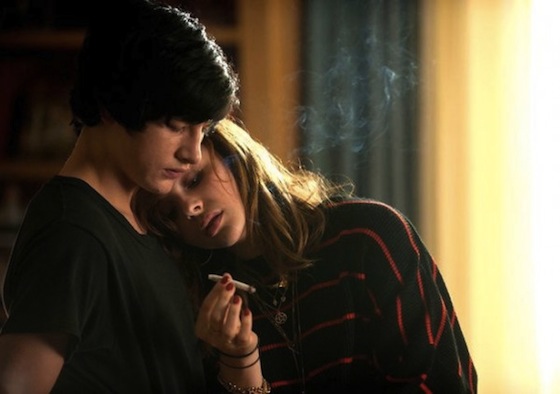 Gillian Flynn may be a clever writer, who crafts extravagant scenarios to make her readers question what they might do in this crazy situation. The problem is that this clever construction undermines any sense of reality and overlooks development of character. The world in Flynn’s stories does not resemble our own. Even in the most fantastical tale we should see reflections of ourselves otherwise the entire story becomes a pointless game employed to pass a couple of hours.
Gillian Flynn may be a clever writer, who crafts extravagant scenarios to make her readers question what they might do in this crazy situation. The problem is that this clever construction undermines any sense of reality and overlooks development of character. The world in Flynn’s stories does not resemble our own. Even in the most fantastical tale we should see reflections of ourselves otherwise the entire story becomes a pointless game employed to pass a couple of hours.
Fantastic Four and Dark Places are very different, but both fail because of the problems on the page. They were both doomed before any cameras rolled.







Comments on this entry are closed.